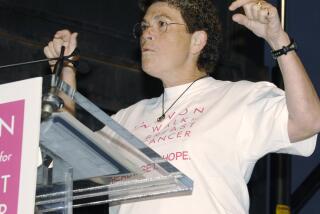Rose Kushner, 60; Medical Writer, Advocate
NEW YORK — Rose Kushner, a medical writer whose discovery of a small lump in her breast in 1974 made her into a tireless advocate for women facing disfigurement and death, has died of breast cancer.
The author of “Breast Cancer: A Personal History and an Investigative Report,” which was credited with changing surgical procedures and treatment of that disease, was 60.
She lived in Kensington, Md., and died Sunday.
After her initial panic over the discovery of her own cancer in June, 1974, she began investigating her options and quickly determined that the preferred method of treatment involved a disfiguring procedure known as the Halsted radical mastectomy, perfected in 1889.
(In the mid-1970s, a woman undergoing treatment would be anesthetized and the lump removed for biopsy. If it was malignant, the breast would be removed. The patient would not know until she awoke whether the breast was gone.)
Mrs. Kushner’s research led her to other options that breast cancer specialists initially rejected, including less-radical surgeries, which today are commonplace.
She fought against the one-step mastectomy that also involved removal of pectoral muscle and lymph nodes, arguing that women needed time after a diagnosis to find the best surgeon. After 18 phone calls, she finally found a general surgeon who would remove just the lump.
Now, the one-step procedure is no longer used and lumpectomies, in which the malignant lump is removed but the rest of the breast is left, have become common.
“She is probably the single most important person in leading to this major change in breast surgery,” Dr. Bruce A. Chabner once said. Chabner is the director of the division of cancer treatment at the National Cancer Institute in Bethesda, Md. “I don’t think the public would have accepted it or even known about it if she had not been so persistent in her efforts.”
Mrs. Kushner founded and was director of the Breast Cancer Advisory Center, through which she provided women with information about their options when faced with the disease.
This year, she was scheduled to be awarded the James Ewing award from the Society of Surgical Oncology for the outstanding contribution by a non-physician to the fight against cancer.
Her husband, Harvey Kushner, called this “poetic justice.” In 1975, the society’s members had booed her off the stage after she challenged their standard procedures.






